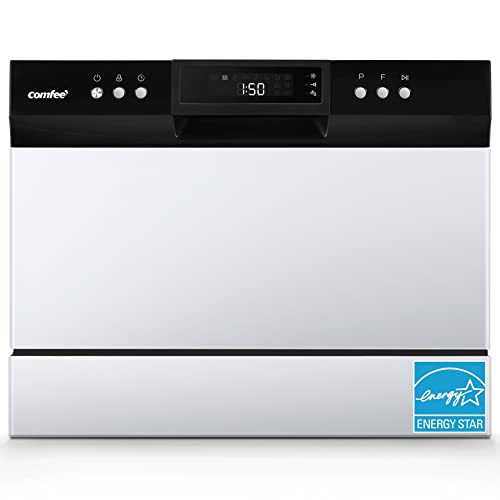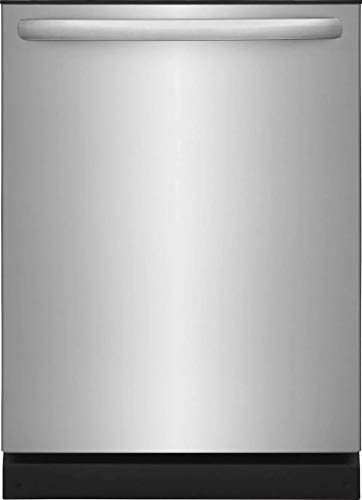Best Consumer Rated Dishwashers,Reports, Reviews, Tips, and Guides in 2022
When it comes time to buy a dishwasher, there are many factors to consider. What size do you need? What features are important to you? And what consumer ratings should you trust? In this blog post, we’ll help you make the best decision for your home by highlighting some of the highest-rated dishwashers on the market. So whether you’re in the market for a budget model or something more high-end, read on for our recommendations!
Top 10 Best Dishwashers to Buy in 2022:
Below is the list of top 10 Best Dishwashers that you can have a look at and buy. Check one by one carefully before purchasing:
*Note: Score is based on our AI score (Editor’s choice and rating)
What is Dishwashers?
A dishwasher is a machine for cleaning dishware and cutlery automatically. Unlike manual dishwashing, which relies largely on physical scrubbing to remove soiling, the mechanical dishwasher cleans by spraying hot water at the dishes, which is then drained away and collected in a sink.
How does Dishwashers Work?
1. You load the dishwasher with dirty dishes.
2. The dishwasher sprays hot water at the dishes to clean them.
3. The dirty water is collected in a sink and drained away.
4. The clean dishes are unloaded from the dishwasher.
What are the Different Types of Dishwashers?
1. Countertop Dishwashers
2. Portable Dishwashers
3. Built-In Dishwashers
4. Undercounter Dishwashers
5. Compact Dishwashers
What are the Different Features of Dishwashers?
1. Water Efficiency
2. Heating Element
3. Rinse Aid Dispenser
4. Hard Food Disposer
5. Delay Start
6. Sanitize Cycle
7. Soil Sensor
What are the Benefits of Using Dishwashers?
Dishwashers are an essential part of any modern kitchen. They save time and energy, and can even help to conserve water. Here are some of the top benefits of owning a dishwasher:
1. Save time and energy: Dishwashers can save you a lot of time and energy, especially if you have a large family or entertain often. Rather than spending hours washing dishes by hand, you can simply load them into the dishwasher and let it do the work for you.
2. Help conserve water: Dishwashers use much less water than washing dishes by hand. In fact, some dishwashers use as little as 3 gallons of water per cycle. This can make a big difference in your water bill and help to conserve our natural resources.
3. Sanitize your dishes: Dishwashers use hot water and detergent to sanitize your dishes, which is important for preventing the spread of bacteria.
4. Save space: Dishwashers can free up a lot of space in your kitchen. If you have a small kitchen, you can even get a dishwasher that can be mounted under your counter.
5. Increase your home’s value: Dishwashers are a great selling point if you ever decide to put your home on the market. Many home buyers are looking for homes that have dishwashers, so having one can increase the value of your home.
If you’re considering purchasing a dishwasher, keep these benefits in mind. Dishwashers can save you time and energy, help conserve water, and even increase the value of your home.
Pros and Cons of Dishwashers
Dishwashers have become a staple in many kitchens across America. Though they may seem like a luxury, they can actually save you time and energy in the long run. Here are some pros and cons of dishwashers to help you decide if one is right for your home.
Pros:
Saves time: Washing dishes by hand can take a lot of time, especially if you have a large family or entertain often. A dishwasher can free up your time so you can enjoy your company instead of being stuck in the kitchen.
Saves water: Dishwashers use less water than washing dishes by hand. They also use less energy, which can save you money on your utility bills.
Sanitary: Dishwashers use hot water and steam to sanitize your dishes, which is more effective than washing by hand. This is especially important if you have young children or someone in your home with a weakened immune system.
Convenient: Dishwashers can be used to wash more than just dishes. You can also use them to clean pots and pans, utensils, and even baby bottles.
Cons:
Initial cost: Dishwashers can be expensive, especially if you need to buy additional accessories like a water line or dishwasher hookup kit.
Water usage: Though dishwashers use less water than washing dishes by hand, they still use a lot of water. This can be a concern if you’re trying to be eco-friendly or conserve water.
Maintenance: Dishwashers require regular maintenance to keep them running properly. This includes cleaning the filters and emptying the trap of food and grease.
Not all dishes are dishwasher-safe: Some dishes, like cast iron or delicate china, can’t go in the dishwasher. You’ll need to handwash these items.
Dishwashers can be a great addition to your kitchen, but they’re not right for everyone. Consider the pros and cons before making your decision.
How to Use Dishwashers?
1. Read the manufacturer’s instructions carefully before using your dishwasher for the first time.
2. Fill the dishwasher with detergent and water according to the manufacturer’s instructions.
3. Load the dishwasher with dirty dishes, making sure to not overcrowd it.
4. Run the dishwasher on a cycle that is appropriate for the amount and type of soiled dishes.
5. Unload the clean dishes from the dishwasher and put them away.
Common Mistakes When Using Dishwashers
Dishwashers are a great way to save time and energy when cleaning up after a meal. However, there are a few common mistakes that people make when using them. Here are four of the most common mistakes:
1. Overloading the dishwasher
One of the most common mistakes people make is overloading the dishwasher. This can cause the dishwasher to work less effectively and can also lead to water leaks. When loading the dishwasher, make sure to leave enough space between the dishes so that water can circulate properly.
2. Not pre-rinsing the dishes
Another common mistake is not pre-rinsing the dishes before loading them into the dishwasher. This can cause food to get trapped in the dishwasher and can lead to poor cleaning results. To avoid this, be sure to rinse your dishes before loading them into the dishwasher.
3. Using the wrong detergent
Another common mistake is using the wrong detergent. Using a detergent that is not designed for dishwashers can cause poor cleaning results and can also damage the dishwasher. Be sure to use a dishwasher-specific detergent to get the best results.
4. Not cleaning the dishwasher
One final common mistake is not cleaning the dishwasher regularly. This can lead to a build-up of dirt and grime, which can eventually lead to poor cleaning results. To avoid this, be sure to clean your dishwasher regularly according to the manufacturer’s instructions.
Factors to Consider Before Buying Dishwasher?
1. Capacity
The first factor to consider when buying a dishwasher is the capacity. Dishwashers come in a variety of sizes, so it’s important to choose one that will meet your needs. If you have a large family or entertain often, you’ll need a dishwasher with a larger capacity.
2. Installation
Another factor to consider is installation. Some dishwashers can be installed by the homeowner, while others require professional installation. Be sure to check the installation requirements before making your purchase.
3. Cost
The cost of the dishwasher is also an important factor to consider. Dishwashers range in price from around $200 to $1,000 or more. Be sure to set a budget before shopping so you can narrow down your options.
4. Energy efficiency
Another factor to consider is energy efficiency. Dishwashers use a lot of water and electricity, so it’s important to choose an energy-efficient model. Look for dishwashers with the ENERGY STAR label to be sure you’re getting an efficient model.
5. Features
Finally, you’ll also want to consider the features offered by different dishwasher models. Some dishwashers have special features like delayed start timers or built-in water softeners. Consider which features are most important to you and choose a model that offers them.
6.Brand
There are many brands of dishwashers on the market, so it’s important to do your research before making a purchase. Some of the most popular brands include GE, Bosch, and KitchenAid. Be sure to read reviews to find out which brands are most reliable.
7.Warranty
Be sure to check the warranty before making your purchase. Most dishwashers come with a one-year limited warranty. However, some brands offer extended warranties for an additional cost.
8.Type
Dishwashers come in two basic types: built-in and portable. Built-in dishwashers are installed under the counter and require professional installation. Portable dishwashers can be moved from one location to another and don’t require installation.
9.Size
Dishwashers come in a variety of sizes, so it’s important to choose one that will fit in your kitchen. The size of the dishwasher should be based on the number of people in your household and how often you entertain.
10.Color
Dishwashers are available in a variety of colors, so you can choose one that matches your kitchen décor. Some of the most popular colors include white, black, and stainless steel.
11.Material
Dishwashers are typically made from stainless steel, plastic, or a combination of both. Stainless steel dishwashers are more durable but also more expensive. Plastic dishwashers are less expensive but not as durable.
12.Color
Dishwashers are available in a variety of colors, so you can choose one that matches your kitchen décor. Some of the most popular colors include white, black, and stainless steel.
13.Water usage
One final factor to consider is water usage. Dishwashers use a lot of water, so it’s important to choose a model that is water-efficient. Look for dishwashers with the WaterSense label to be sure you’re getting a model that uses less water.
FAQs
1. What are the different types of dishwashers?
The two main types of dishwashers are built-in and portable. Built-in dishwashers are installed under the counter and require professional installation. Portable dishwashers can be moved from one location to another and don’t require installation.
2. What is the best brand of dishwasher?
There are many brands of dishwashers on the market, so it’s important to do your research before making a purchase. Some of the most popular brands include GE, Bosch, and KitchenAid. Be sure to read reviews to find out which brands are most reliable.
3. How much does a dishwasher cost?
Dishwashers range in price from around $200 to $1,000 or more. Be sure to set a budget before shopping so you can narrow down your options.
4. How much water does a dishwasher use?
Dishwashers use a lot of water, so it’s important to choose a model that is water-efficient. Look for dishwashers with the WaterSense label to be sure you’re getting a model that uses less water.
5. What are some features to look for in a dishwasher?
Some features to look for in a dishwasher include energy efficiency, delayed start timers, and built-in water softeners. Consider which features are most important to you and choose a model that offers them.
6. What size dishwasher do I need?
Dishwashers come in a variety of sizes, so it’s important to choose one that will fit in your kitchen. The size of the dishwasher should be based on the number of people in your household and how often you entertain.
7. What is the warranty on a dishwasher?
Most dishwashers come with a one-year limited warranty. However, some brands offer extended warranties for an additional cost. Be sure to check the warranty before making your purchase.
8. How often should I run my dishwasher?
It’s generally recommended to run your dishwasher once a week. However, if you have a large family or entertain often, you may need to run it more frequently.
9. What are some tips for cleaning my dishwasher?
Here are some tips for cleaning your dishwasher:
-Run the dishwasher empty at least once a month. This will help remove any build-up of soap scum or food particles.
-Add vinegar to the detergent compartment and run a cycle on the hottest setting once a month. This will help remove any mineral deposits that can cause the dishwasher to operate less efficiently.
-Clean the exterior of the dishwasher with a damp cloth. Be sure to clean around the door seal and the control panel.
-If your dishwasher has a filter, be sure to clean it on a regular basis. Depending on the model, you may need to clean it once a month or once a week.
10. How do I know if my dishwasher is working properly?
Here are some signs that your dishwasher is not working properly:
-The dishwasher doesn’t seem to be cleaning dishes as well as it used to. This could be due to a build-up of soap scum or food particles.
-The dishwasher is leaving spots on dishes. This could be due to hard water or a dirty filter.
-The dishwasher is making strange noises. This could be due to a loose part or a build-up of dirt and debris.
Conclusion
Dishwashers are an important part of any home, and it’s important to choose the right one. We’ve looked at some of the best consumer rated dishwashers on the market and what makes them stand out. Whether you need a top loader or front loader, large or small dishwasher, there is sure to be a machine that fits your needs and your budget. If you have any questions about which dishwasher might be best for you, don’t hesitate to reach out to us. We are happy to help!
I’m Georgie Barton, a reviewer for various magazines and consumer reports. I’ve been testing and writing about household products and electronics for years, and have become quite the authority on the subject. My goal is to help people make informed decisions when purchasing these items, so they can get the most value for their money.
My hope is that through my work, everyone will be able to find a quality and satisfactory product. Thank you for reading!










